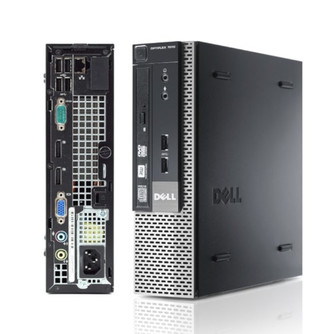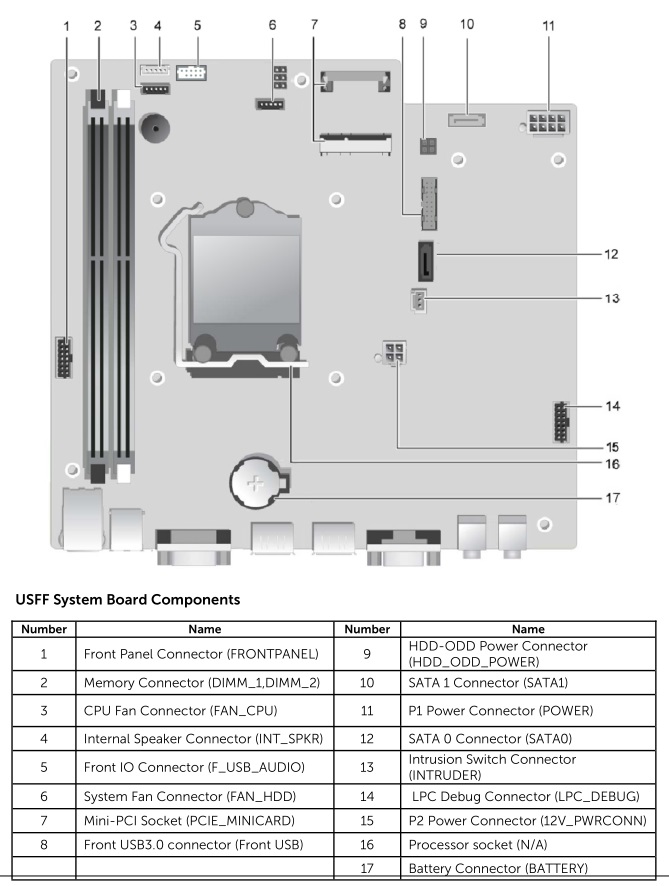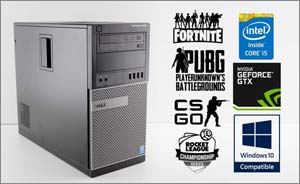Dell OptiPlex 9010 USFF
Specification and Upgrade Options
The Dell OptiPlex 9010 USFF is a pre-built business desktop computer first released in 2012. Although more than five years old, it is still a viable solution for home and office. The motherboard is using the Q77 chipset and supports 3th gen Intel Core processor, 16GB of DIMM DDR3-1333/1600 memory. Because of its size, this model cannot be properly upgraded for gaming.
Dell OptiPlex 9010 USFF is a Ultra Small form factor computer. Ultra Small Form Factor (USFF) computers are useful when you are low on space. This form factor is not so popular anymore and has been superseded by the Micro. As expected, free space inside those machines is extremely limited. Swapping components is of course easy, but adding something more powerful is not an option due to reduced cooling.
Can you upgrade Dell OptiPlex 9010 USFF to play games?
Dell OptiPlex 9010 USFF is a business desktop computer in micro form factor. It is using a processor that provides both the CPU and GPU functionality. While integrated GPUs are sufficient for basic gaming, they are not powerful enough to run demanding games. Dell OptiPlex 9010 USFF has no space for dedicated graphics card.
Micro desktop machines like Dell OptiPlex 9010 USFF are usually used as home theater PCs (HTPC), in home lab projects or a as home automation servers.
Please explore the sections bellow to find ideas and suggestions on how to upgrade Dell OptiPlex 9010 USFF.
Windows 11 compatibility
No, Dell OptiPlex 9010 USFF does not meet the Windows 11 hardware requirements. According to Windows 11 specification, all models with Intel 7th Gen CPU or older are not officially supported. Processor with TPM 2.0 and a UEFI Secure boot BIOS is also required in order to upgrade from Windows 10 to Windows 11 through Windows Update.
However, anyone with PC that does not pass the upgrade test can download the official Windows 11 ISO, make a bootable flash drive, and install the OS manually.
GPU upgrade
It is not possible to upgrade Dell OptiPlex 9010 USFF with a dedicated GPU due to the lack of space and absence of a PCIe slot. However, you can still use the integrated graphics processor for gaming. There are number of games you can enjoy with an Intel HD and UHD iGPU.
Processor
The Dell OptiPlex 9010 USFF supports Gen3 Intel Core technology. The 3rd gen Intel Core CPUs have the code name Ivy Bridge. They use a 22nm manufacturing process developed by Intel. Here the maximum number of core are 6 with i7 processor. Desktops model use either the LGA 1155 or the LGA 2011 sockets and DDR3-1333 to DDR3-1600 RAM.
Best CPUs for Dell OptiPlex 9010 USFF upgrade:
| Model | Cores (Threads) | Base frequency | Turbo |
|---|---|---|---|
| Core i5 3550 | 4(4) | 3.3 GHz | 3.7 GHz |
| Core i7 3750 | 4(4) | 3.4 GHz | 3.8 GHz |
| Core i7 3770 | 4(8) | 3.4 GHz | 4.9 GHz |
Memory
Dell OptiPlex 9010 USFF has two RAM slots. This is more than enough for most users. For those of you who need extra flexibility and RAM size, go for a model with 4 memory slots.
To cover the needs of your OS, games, and apps, Dell OptiPlex 9010 USFF supports up to 16 GB of DIMM DDR3-1333/1600 RAM. For office work, home use, and light gaming we recommend 8GB of RAM. For everything else, use 16GB or more.
Faster RAM speeds permit your processor to access the data stored inside the memory faster. This is important for the overall speed of your system. The motherboard of the Dell OptiPlex 9010 USFF supports RAM speeds of up to 1600 MT/s.
Wi-Fi Support
Dell OptiPlex 9010 USFF doesn't come with any on-board Wi-Fi support. In that case, you have two options to upgrade this model with Wi-Fi. You either use an external USB Wi-Fi adapter (wireless network dongle) or a PCIe-based wireless adapter.
The USB dongle is much more convenient and easy to install, but has less space for a decent antenna and can have thermal problems. On the other hand, the PCIe based adapter is much more powerful, more reliable, and has better antenna, but it is harder to install.
Wi-Fi and Bluetooth wireless adapter upgrades for Dell OptiPlex 9010 USFF:
| Model | Speed | Frequency | Interface |
|---|---|---|---|
| WiFi 6E (Gig+) Kit | 3000 Mbit/s | 2.4GHz / 5GHz | NGFF M.2 A/E Key |
| Rekong AX210 | 3000 Mbit/s | 2.4GHz / 5GHz | NGFF M.2 A/E Key |
| Gigabyte GC-Wbax200 | 2400 Mbit/s | 2.4GHz / 5GHz | PCIe |
| TP-Link Archer TX50E | 2400 Mbit/s | 2.4GHz / 5GHz | PCIe |
| TP-Link Archer T9UH | 1300 Mbit/s | 2.4GHz / 5GHz | USB 3.0 |
Ports
Ports are important and often people don't think about them when buying a PC. For example, if you don't have enough USB ports, using external devices becomes problematic. Before you buy any system, considering your use case, check the number of external devices you are going to use and plan the number of the extension ports accordingly.
USB ports
The Dell OptiPlex 9010 USFF comes with six USB ports in total. Having more USB ports is always better, but also pay attention to the version of those USB ports. Higher version ports support faster transfer speeds. Unfortunately, this model doesn't come with a USB 3.1 port. If you need a faster connection for your peripherals, like external Solid State Drive, you will need to choose another model.
Video ports
The DisplayPort (DP) is the most widely used digital interface for transmitting digital video and audio between display devices and PCs. It is good to see that the Dell OptiPlex 9010 USFF is featuring a DisplayPort 1.1. The post version is important if you target higher resolutions with high refresh rate. Although, ver. 1.2 is completely fine for most users, if possible, aim for the higher versions DisplayPort.
The HDMI port is another digital video port you can use to connect external display. It has very similar capabilities to the DisplayPort with few exceptions. However, the Dell OptiPlex 9010 USFF doesn't have one. This is not a problem if there is on-board DisplayPort.
*Please keep in mind in order to use the video ports available through the motherboard, you need a CPU with integrated graphics card. If you have a dedicated GPU, use his ports instead.
SSD storage - M.2 sockets and SATA ports
The SATA port is one of the places where you can connect a stora gedevice. The Dell OptiPlex 9010 USFF comes with two SATA port(s). Not enough SATA ports might limit your options for additional storage devices. Think about your use case and decide if the SATA ports provided by this model will be sufficient.
Unfortunately, the Dell OptiPlex 9010 USFF has no M.2 PCIe soket and you have to rely on the available SATA ports to connect your drives.
The M.2 PCIe SSD connector in combination with an NVMe drive allows for higher transfer rates, compared to the old SATA interface. In some situations, NVMe device connected to the M.2 PCIe socket can be more than 5 times faster.
Power Supply
The Dell OptiPlex 9010 USFF comes with a 200 Watt PSU. Having a power supply with high power rating is important, especially if you are doing upgrade with addtional components, like dedicated GPU and more HDDs. Will this 200 W be enough, it all depends on your specific use. Please keep in mind that some models might have more than one PSU option. Whenever possible get the most powerful one, as it might make future upgrades easier.



